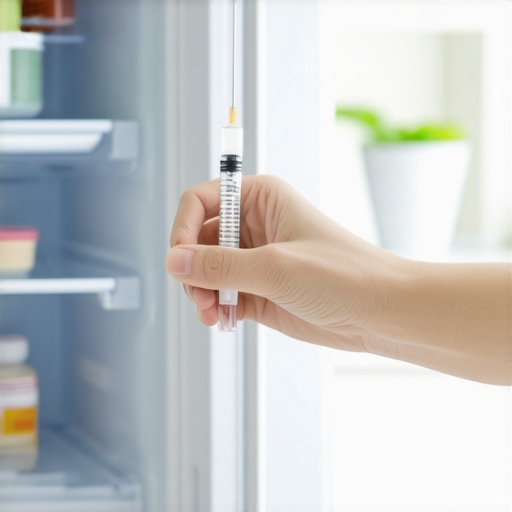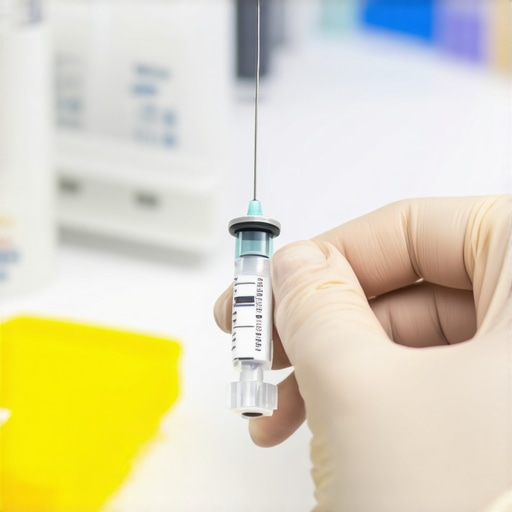Welcome to the Wild World of Weight Loss Injections: Are You Ready to Handle Them Safely?
Imagine this: You’ve finally decided to give those prescription weight loss injections a shot. Exciting, right? But hold your horses—before you start pinning yourself like a seasoned pro, let’s talk about the unsung heroes of your weight loss journey: handling and storage. Trust me, mishandling these tiny titans can turn your dream into a nightmare. So, buckle up as we dive into the art of keeping your injections safe, effective, and ready to work their magic.
Why Proper Handling and Storage Are the Unsung Heroes of Your Weight Loss Success
Ever wondered why some folks see stellar results while others face side effects or subpar outcomes? The secret often lies in how well they handle and store their medication. Think of your injections as delicate little gems—drop them carelessly, and they might lose their potency or even become unsafe. From temperature control to proper disposal, every detail counts in this game of precision and safety.
Keep It Cool, Keep It Safe: The Cold, Hard Truth About Storage
Is Your Refrigerator the New Best Friend of Your Injections?
Absolutely! Most prescription weight loss injections, like semaglutide or tirzepatide, demand refrigeration—think of it as their VIP lounge. Maintaining a consistent temperature, usually between 2°C and 8°C (36°F to 46°F), is critical. Avoid the temptation to store them in the freezer or the door’s outside pocket, where temperatures fluctuate wildly. Remember, a stable environment ensures your medication’s potency remains intact, so your weight loss journey stays on track.
Handling with Care: The Dos and Don’ts
Have you ever tried to handle a delicate crystal vase? It requires finesse, and so do your injections. Always wash your hands thoroughly before handling. Use the proper technique to draw the medication into the syringe, avoiding bubbles that can cause inconsistent dosing. When administering, ensure the injection site is clean and use the right angle—usually 90 degrees for subcutaneous injections. A little care goes a long way in minimizing discomfort and side effects.
Disposal and Documentation: The Final Pieces of the Puzzle
What’s worse than a poorly stored injection? An improperly disposed needle! Never toss used needles in your regular trash. Use designated sharps containers to prevent accidents and keep your household safe. Also, keep a log of your injections—date, time, site—to track your progress and catch any potential issues early. Trust me, organization is your best friend here.
Are You Ready to Become a Storage & Handling Guru?
In the end, safe handling and storage are not just bureaucratic hoops—they are the backbone of effective weight loss with prescription injections. Properly stored and handled medications can significantly improve results and reduce side effects. Want to learn more? Check out this comprehensive guide from E Weight Loss Tips.
Now, I’d love to hear your thoughts. Have you faced challenges with handling your injections? Drop your tips or questions in the comments below!
Unlocking the Secrets of Proper Injection Handling and Storage: Your Key to Long-term Weight Loss Success
Have you ever wondered how the tiny details of handling and storing your weight loss injections can dramatically influence your results? As seasoned experts in medical weight management know, these seemingly small actions are actually vital components of a successful journey. Proper handling and storage do more than just preserve medication potency—they also safeguard your health and enhance your overall experience. From temperature regulation to meticulous disposal, mastering these aspects ensures your weight loss plan stays on course and delivers the results you desire.
Could Storage Conditions Be the Hidden Factor Behind Your Weight Loss Outcomes?
It’s a compelling question. Many individuals focus on diet and exercise, yet overlook how crucial storage conditions are for injectable medications like semaglutide or tirzepatide. When stored improperly—say, outside of the recommended refrigerator temperatures—the medication can degrade, reducing effectiveness and risking side effects. According to authoritative sources such as E Weight Loss Tips, maintaining a consistent cold environment between 2°C and 8°C (36°F to 46°F) is essential to preserve the drug’s integrity. This underscores the importance of a dedicated, temperature-controlled storage space, ideally a refrigerator, and avoiding frequent temperature fluctuations.
What Are the Practical Steps to Ensure Your Injections Stay Potent and Safe?
Handling your injections with care begins with clean hands—always wash thoroughly before touching the medication or syringe. Use the proper technique to draw the correct dose, avoiding air bubbles that can interfere with dosing accuracy. When administering, select a clean injection site and use the recommended angle—typically 90 degrees for subcutaneous injections—to minimize discomfort and side effects.
Disposal is equally critical. Never throw used needles in regular trash; instead, utilize designated sharps containers to prevent injuries and contamination. Additionally, keep a detailed log of your injections—tracking the date, time, and site—to identify patterns or issues early on. This level of organization not only promotes safety but also enhances your ability to discuss progress with your healthcare provider.
Are You Ready to Become a Storage & Handling Expert for Long-lasting Fat Loss?
In the realm of injectable weight loss treatments, careful handling and correct storage are not optional—they are foundational. Proper practices help maximize medication efficacy, reduce side effects, and ultimately support your weight loss goals. For comprehensive guidance on safe storage and handling, consider reviewing detailed resources like E Weight Loss Tips. Remember, your diligence today lays the groundwork for lasting success tomorrow.
Have you experienced challenges or discovered effective tips when managing your injections? Share your insights or questions in the comments below—your story might inspire someone else on their weight loss journey!
Unlocking Advanced Techniques for Preserving the Potency of Your Weight Loss Injections
While proper storage and handling are fundamental, delving deeper into the nuances can significantly elevate your success rate. Did you know that even minor fluctuations in storage temperature or exposure to light can compromise the integrity of your medication? According to a comprehensive review published in Drug Development and Industrial Pharmacy, maintaining an environment free from temperature spikes and UV exposure is crucial for the stability of peptide-based injectables like semaglutide. Consider investing in a dedicated mini-fridge or a temperature-controlled medication safe that ensures consistent conditions, especially if you travel often or experience power outages.
How Can You Implement a Robust Handling Protocol to Minimize Medication Degradation?
Beyond basic hygiene, integrating a meticulous handling protocol can prevent inadvertent damage. For instance, always inspect your medication before use—look for any discoloration, cloudiness, or particulate matter that could indicate degradation. Use calibrated syringes to draw accurate doses, and employ air bubble removal techniques—tap the syringe and gently push the plunger—to ensure precise administration. When storing unused medication, keep it in its original packaging to shield it from light and environmental factors, and avoid frequent temperature fluctuations caused by opening and closing the fridge door repeatedly.
Furthermore, adopting a **digital reminder system** to track injection times and storage conditions can enhance compliance. Apps that log temperature data, if you use a temperature-monitoring device, or set alerts for medication expiry dates, help you stay proactive and avoid accidental mishandling.
Unlocking Advanced Storage Strategies to Preserve Your Weight Loss Medications
While maintaining a refrigerator at a consistent 2°C to 8°C is fundamental, seasoned users are now exploring innovative temperature management solutions to optimize medication efficacy. For instance, investing in a dedicated medical-grade mini-fridge or a portable temperature-controlled case can safeguard your injections during travel or power outages. These devices often come with digital thermostats and real-time monitoring, ensuring your medication remains within the ideal temperature range at all times. According to E Weight Loss Tips, such proactive measures significantly reduce the risk of degradation caused by environmental fluctuations, thereby maximizing your treatment outcomes.
How Can You Implement a Robust Handling Protocol to Minimize Medication Degradation?
Beyond basic hygiene and proper storage, developing a comprehensive handling protocol is crucial. Always inspect your medication before use—look for cloudiness or particulate matter, which could indicate degradation. Use calibrated syringes to draw your dose, employing techniques such as tapping the syringe to remove air bubbles and gently pushing the plunger for precise dosing. When storing unused medication, keep it in its original packaging, shielded from light and temperature swings caused by frequent fridge door openings. Incorporating a digital reminder system—either via smartphone apps or dedicated devices—to log injection times and monitor storage conditions can significantly enhance adherence and safety. Studies in Drug Development and Industrial Pharmacy emphasize that consistent handling practices directly correlate with improved efficacy and minimized side effects.
< >
>
Leveraging Expert Advice to Maximize Injection Effectiveness and Longevity
For those seeking to elevate their handling practices further, consulting with healthcare professionals offers tailored strategies. Regular check-ins with your provider can help refine your storage and handling routines, especially if you travel frequently or encounter environmental challenges. Moreover, integrating educational resources like doctor-backed guidance ensures you stay informed about best practices. Remember, meticulous attention to detail today not only preserves your medication’s potency but also contributes to achieving sustainable weight loss results over time.
If you’ve discovered unique tips or faced particular challenges in managing your injections, share your insights below. Your experience could be the key to helping others succeed in their weight loss journey!
Expert Insights & Advanced Considerations
1. Precision in Storage Conditions Enhances Medication Stability
Maintaining a consistent temperature within the recommended range of 2°C to 8°C is vital for preserving the integrity of peptide-based injectables like semaglutide. Investing in dedicated medical-grade refrigeration ensures minimal temperature fluctuations, thereby maximizing efficacy and reducing degradation risks.
2. Advanced Handling Protocols Minimize Degradation and Side Effects
Inspect medications before each use for discoloration or particulates, employing calibrated syringes for accurate dosing, and utilizing techniques to remove air bubbles. Proper site selection and technique reduce discomfort and improve absorption, leading to better results.
3. Digital Monitoring Enhances Compliance and Safety
Utilizing apps or devices that log injection times and monitor storage conditions helps maintain adherence, prevents accidental mishandling, and provides data for discussions with healthcare providers, enabling personalized adjustments.
4. Traveling with Injections Requires Specialized Equipment
Using portable, temperature-controlled cases or mini-fridges with real-time monitoring ensures medications remain within safe temperature ranges during travel, safeguarding their potency and your investment in your health journey.
5. Regular Professional Consultations Refine Handling Practices
Periodic reviews with healthcare professionals can identify areas for improvement, adapt handling routines to changing circumstances, and incorporate the latest safety innovations, ensuring ongoing effectiveness and safety.
Curated Expert Resources
- American Society of Health-System Pharmacists (ASHP): Provides guidelines on medication storage and handling best practices, emphasizing safety and efficacy.
- FDA Medication Storage Guidelines: Offers authoritative recommendations for storing peptide-based medications, including temperature ranges and handling precautions.
- Drug Development and Industrial Pharmacy Journal: Features peer-reviewed research on stability, degradation factors, and advanced storage solutions for injectable pharmaceuticals.
- Clinical Pharmacology Resources: Supplies detailed protocols for handling and administering injection medications in clinical settings, applicable to self-administration.
Final Expert Perspective
In the realm of prescription weight loss injections, mastering advanced handling and storage techniques is not merely a precaution but a strategic necessity. As the science of peptide stability evolves, so must our practices—embracing innovative storage solutions, meticulous handling routines, and continuous professional guidance. These steps ensure that your medication remains potent, side effects are minimized, and your weight loss journey is optimized. For those committed to long-term success, integrating expert advice and cutting-edge strategies is an investment in both safety and efficacy. If you’re eager to deepen your expertise, explore additional resources or share your insights—your experience can illuminate the path for others navigating this complex yet rewarding landscape.

